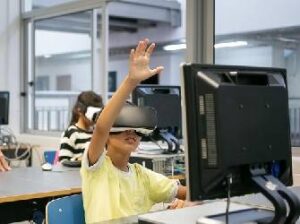Children today need to start learning about technology early.
In comparison to their older counterparts, the new generation interacts with technology earlier and more frequently. “Digital natives” are the children of today. They were raised in and around technology their entire lives, having been born during the digital age. It goes without saying that they will grow up being conversant with the newest technology and devices.
When you hand a young child a smartphone or tablet, he or she immediately understands how to use it. It now functions as a new instinct. Kids demonstrating how to utilise the newest technology to adults in their home is a pretty regular sight. However, we avoid educating them further on the science underlying the technology’s operation.
Few parents are confident about enrolling their children in a recognized institution that offers coding courses and other IBA The Robotized World related courses. We frequently neglect the idea that ordinary academics are insufficient for our students and instead place all of our attention on them. The world now is run by technology. And we need to make sure that our children have the necessary abilities in order for them to survive in this digital age.

But why children? When kids are grown, they can always learn it, right
Well, a person’s capacity for learning and memory changes with age. Children pick up new information more quickly than adults. When applied in a targeted and concentrated manner, technology can help children in their early years in a big way. and assist them in achieving their educational objectives at a young age. The brain of a youngster is like a blank canvas; it is simpler to paint on than a canvas that has been painted on previously.
Children learn concepts more quickly than adults do, and they will have no trouble picking up even the most complex coding concepts. This is because when we learn something new, our young brains form new connections; we only need these connections to get formed and exist, but as we get older, it gets harder for our brains to maintain old connections and form new ones. We can say that over time it stiffens, grows stern, and becomes resistant to learning new things.
Of sure, the 18-year-old you may learn new things, but it is not as simple as it was for the 10-year-old you. We refer to this phenomena as neuroplasticity. According to a University of Washington article on neuroplasticity, neuroplasticity is the brain’s capacity to change – to rewire, retrain, and strengthen critical connections. The brain still has a lot of such connections to make in a young child. The brain will make an effort to enhance the already strong connections while also forging new pathways to learn new skills.
Because our brains form connections when we are young that only get stronger over time, the things we learn or pick up while we are young stay with us for the rest of our lives. The same is true of learning. The earlier children start learning, the better! But for science and technology, it involves far more than simply recalling or logging the information that has been learned. Everything we learn affects how we develop as people and how we behave. Science has shown that teaching children computer science and coding skills improves their ability to learn and think critically.
For a child’s psychological growth, coding is essential. It improves a student’s success in practical academics as well as stirs up key abilities in children like logical reasoning, critical thinking, and effective communication!
There are more opportunities for children with different abilities to interact, communicate, explore, and progress when science and technology are incorporated alongside the conventional educational system and tactile learning techniques are used. What today’s kids can gain from early exposure to technology may already be obvious. A lot. But these are seven glaring advantages of early technological education for children:

Psychological progression
IBA The Robotized World disciplines are essential for a child’s psychological development, as was previously mentioned. It is the ideal synthesis of reason, application, imagination, and innovation. A pupil acquires all the abilities required for better utilising the resources close to him or her. This guarantees that the child’s brain develops in all ways, ensuring overall development. This is crucial from a young age forward to help us shape the child into a gifted and intelligent person supported by the power of technology.




 Previous Post
Previous Post 
